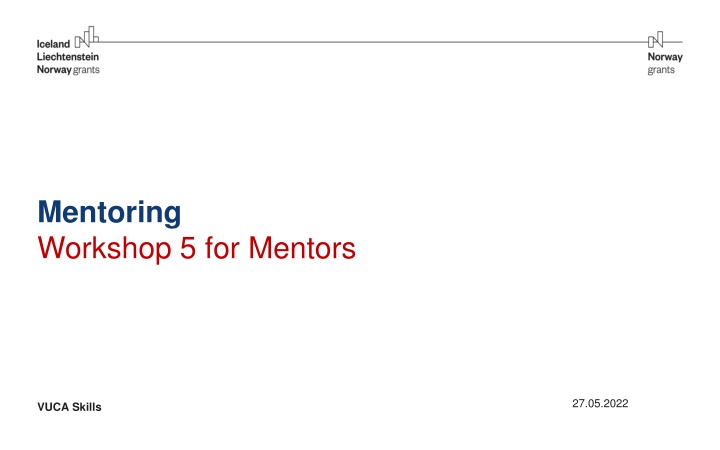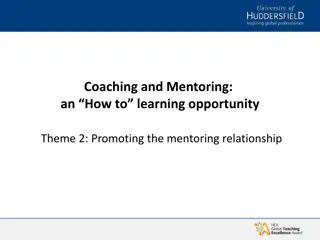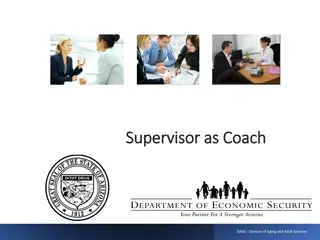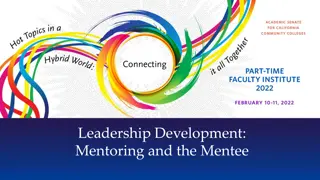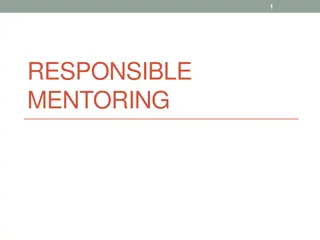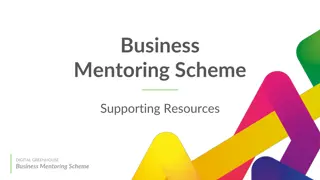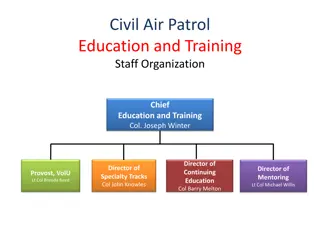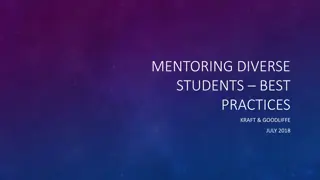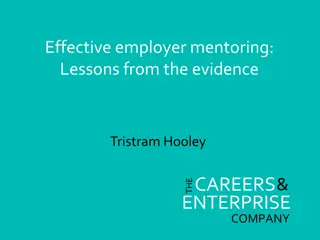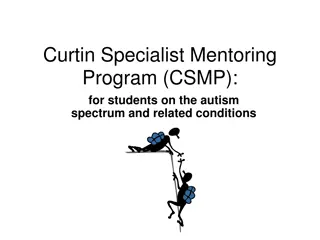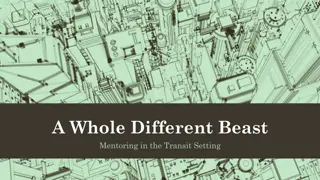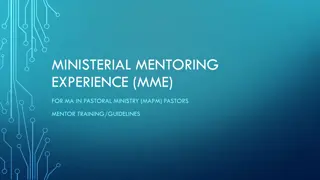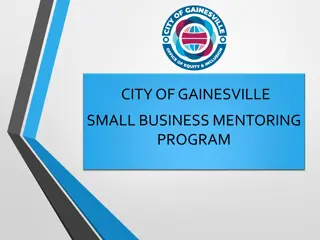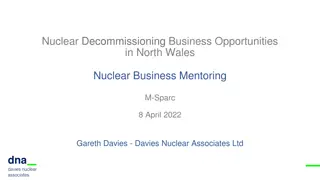Enhancing Mentoring Skills in a VUCA World Workshop
Explore strategies for mentors to navigate the Volatility, Uncertainty, Complexity, and Ambiguity (VUCA) of the modern world. Topics include Effectuation Logic, Covey's Controlling the Controllables, and Circles of Influence. Learn how to prioritize concerns and actions to thrive as a mentor in challenging times.
Download Presentation

Please find below an Image/Link to download the presentation.
The content on the website is provided AS IS for your information and personal use only. It may not be sold, licensed, or shared on other websites without obtaining consent from the author.If you encounter any issues during the download, it is possible that the publisher has removed the file from their server.
You are allowed to download the files provided on this website for personal or commercial use, subject to the condition that they are used lawfully. All files are the property of their respective owners.
The content on the website is provided AS IS for your information and personal use only. It may not be sold, licensed, or shared on other websites without obtaining consent from the author.
E N D
Presentation Transcript
Mentoring Workshop 5 for Mentors 27.05.2022 VUCA Skills
Agenda VUCA Clarification of terms Controlling the Controllables (Covey) Effectuation Crazy Quilt, Lemonade Priciple Fragen und Antworten
Opening Question What is something in you that you can always rely on?
VUCA VOLATILITY: The world becomes more unstable, constant change, changes are less predictable. UNCERTAINTY: More uncertainty because the world is less predictable, past experience is becoming less important. COMPLEXITY: Our world is more complex than ever, harder to understand, challenges and solutions are multi-layered. Decisions are often experienced as reactions. AMBIGUITY: "One size fits all" or "best practice" was yesterday. Things are rarely clear and unambiguous. Demands on companies and management are contradictory and paradoxical. Value systems are challenged or even turned upside down. Adopted from www.vuca-world.org
Effectuation Logic Effectuation [...] focuses on the controllable aspects of an unpredictable future. The logic for using Effectuation processes is: to the extent that we can control the future, we don't need to predict it. Saras Sarasvathy (2001)
Circles of Influence Concerns represents everything that is on your mind Influence represents only those things you can influence Control represents only those things you can actually influence and control Concerns Influence Control
Controlling the Controllables (Covey) step-by-step Step 1: Write down what is on your mind (bullet points). What is on your mind? What worries you? Step 2: Sort the bullet points into 2 groups of things you can control and things you cannot control. Step 3: Now sort the bullet points from the group of things you can control into: Things I can influence and Things I can control. Step 4: Decide when and how you want to tackle the different things. Give top priority to the things you can control. Take care of the things that preoccupy or worry you later.
Example Step 1 Concerns Too much on my plate Ask your coachee/ mentee to write down all their concerns, thoughts feeling. Everything is getting more expensive No progress visible Use one text field for one concern Finding work is difficult Online: use PowerPoint, Mural, Miro etc. Tired, low energy Offline: use post-its or use a piece of paper (draw a circle or create a list) Available jobs don t pay enough Use different coloured markers (i.e. red=concern; blue=influence; black=control) Worried about the future I m stuck
Example Step 2 Concerns Finding work is difficult Everything is getting more expensive Add a second circle Ask your coachee/ mentee to identify those things from the list they can influence. Ask your coachee/mentee to move the text-field towards the appropriate circle Influence Too much on my plate No progress visible Tired Offline: use post-its or use a piece of paper (draw a circle or create a list) Use different coloured markers (i.e. red=concern; blue=influence; black=control) Use one text field for one concern I m stuck Available jobs don t pay enough Worried about the future
Example Step 3 Concerns Finding work is difficult Everything is getting more expensive Add a third circle Influence Ask your coachee/ mentee to identify those things from the list they can influence and control. Control Ask your coachee/mentee to move the text-field towards the appropriate circle Tired Too much on my plate I m stuck Offline: use post-its or use a piece of paper (draw a circle or create a list) Use different coloured markers (i.e. red=concern; blue=influence; black=control) Available jobs don t pay enough No progress visible Worried about the future
Action Planning Focus on activities which your mentee control. Starting with one action can make a lot of sense Think of an action plan if useful Think of a mind-map if useful Tip: let your mentee decide where to start and what to do next!
Effectuation Principles Crazy Quilt: Building my own professional network. It's about new contacts and commitments from potential clients and business partners. Who might we be able to help? Who might be able to help us? Who might we be able to collaborate with? Lemonade: We know that something unexpected can happen, we better expect it. What opportunity might presents itself from the unexpected and unknown?
Crazy Quilt Add to the list "Who do I know?" People who... can help develop a better understanding of markets and customer needs can help develop new ideas can tell who they need to know and who does what are able to pave the way and put you in touch with people who can help you give constructive feedback, challenge decisions and ways of thinking strengthen determination in difficult times and give you a sense of purpose
Breakout Session What was helpful for YOU when you had to deal with uncertainty, complexity, ambiguity and/or volatility? Instructions: Groups of 4-5 Ensure everyone gets equal time Stick to the exercise brief Take notes and sum up the key learning points, be prepared to type your suggestions into the chat box! Report back in plenary Enjoy! Time: 15
Q&A QUESTIONS, SUGGESTIONS, COMMENTS?
References and Suggested Reading Covey, S. R. et al. (2020) The 7 habits of highly effective people : powerful lessons in personal change. Revised and updated. 30th anniversary edition. New York: Simon & Schuster. Sarasvathy, S. D. (2008) Effectuation : elements of entrepreneurial expertise. Cheltenham, Glos, UK: Edward Elgar (New horizons in entrepreneurship). Links: https://www.vuca-world.org https://effectuation.org/the-five-principles-of-effectuation
More information: YES! Thinking Space https://youngentrepreneurssucceed.com/thinking-space/
